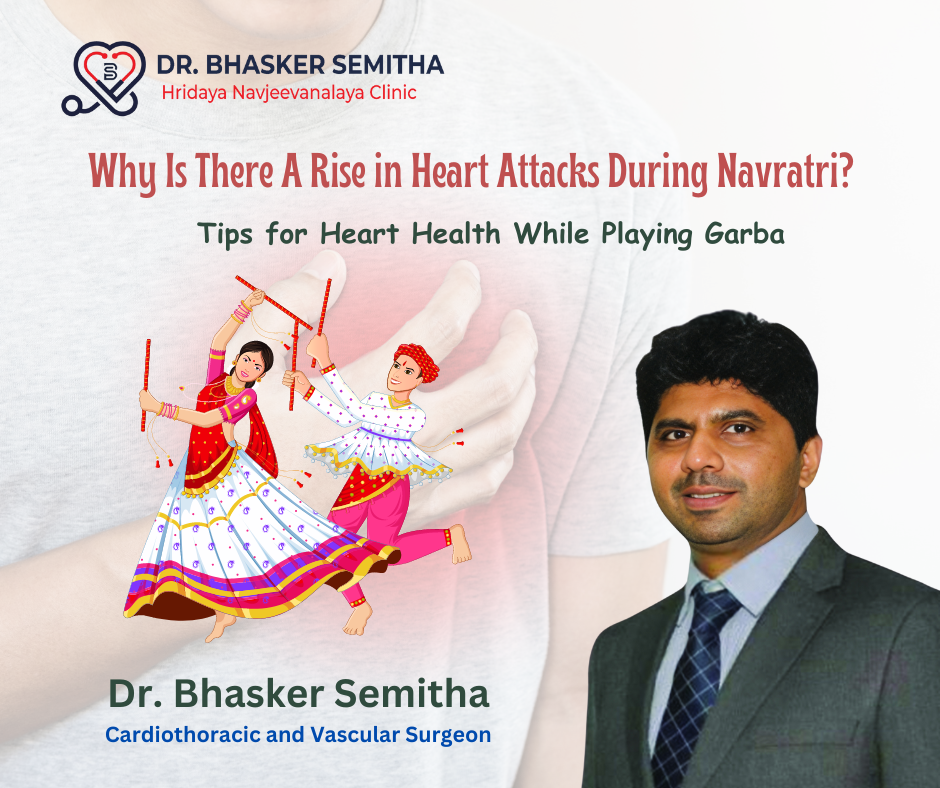Navratri is a time of joy, devotion, and celebration, particularly through the vibrant dance form of Garba. However, over the years, we have noticed an alarming rise in heart-related issues during this festival, especially heart attacks. As a cardiac surgeon, it is essential to understand why this happens and how we can safeguard heart health while enjoying the festivities.

Why Are Heart Attacks More Common During Navratri?
The increase in heart attacks during Navratri can be attributed to several factors:
- Overexertion: Garba is an intense physical activity, especially when performed for extended periods. People who are not accustomed to such levels of exertion can put immense stress on their hearts, leading to cardiac issues.
- Dehydration: Dancing for long hours in crowded, often hot environments can lead to dehydration. Dehydration reduces blood volume, increasing heart strain, and can trigger heart attacks or other cardiac events in people with underlying heart conditions.
- Excessive Fasting: Fasting is a common practice during Navratri. However, for those with diabetes, hypertension, or pre-existing heart conditions, improper fasting can lead to electrolyte imbalances, low blood sugar, and fluctuations in blood pressure, all of which can increase the risk of heart attacks.
- Unhealthy Diet Choices: While fasting, many indulge in deep-fried, sugary, or high-fat foods when breaking their fasts. Such food choices can elevate cholesterol levels, lead to sudden spikes in blood pressure, and increase the risk of heart complications.
- Lack of Adequate Rest: Navratri celebrations often extend late into the night, leading to a lack of sleep. Sleep deprivation negatively impacts heart health by raising blood pressure and increasing the chances of arrhythmias (irregular heartbeats).
- Ignorance of Symptoms: Many people dismiss the warning signs of heart problems—like chest pain, breathlessness, or fatigue—as simple exhaustion from dancing. Delaying medical attention can turn what might be a mild issue into a life-threatening one.
Tips for Heart Health While Playing Garba
To enjoy Navratri safely and reduce the risk of heart issues, here are some vital tips to keep in mind:
- Stay Hydrated
Drink plenty of water before, during, and after playing Garba. Avoid caffeinated or sugary drinks, which can dehydrate you further and increase heart strain. - Pace Yourself
Do not try to dance for hours without breaks, especially if you are not used to regular physical activity. Take short breaks between rounds to allow your heart to recover. Listen to your body—if you feel lightheaded or excessively tired, it’s time to rest. - Eat a Balanced Diet
If you are fasting, ensure that when you break your fast, you consume balanced meals with enough protein, complex carbohydrates, and healthy fats. Avoid heavy, fried, or overly sweet foods that can strain your heart. - Monitor Your Health
If you have a known heart condition, diabetes, or high blood pressure, monitor your vitals before and after dancing. If you feel any discomfort like chest pain, dizziness, or breathlessness, seek medical help immediately. - Do a Warm-Up and Cool-Down
Just like any physical activity, it’s important to warm up your body before dancing. Gentle stretches and slow movements can prepare your heart and muscles. After dancing, cooling down with slow walking and breathing exercises can help your heart return to a normal rhythm. - Know Your Limits
If you have a history of heart problems or are at risk for heart disease, it is important to consult your doctor before engaging in intense physical activities like Garba. Your doctor may provide guidance on safe levels of activity or any medications you may need to adjust. - Get Enough Sleep
Ensure you are getting 7-8 hours of sleep during the festive season. Lack of rest can put unnecessary stress on your heart and increase the risk of cardiac events. - Avoid Alcohol and Smoking
Consuming alcohol or smoking during festivities can lead to sudden increases in blood pressure and heart rate, increasing the chances of heart attacks.
When to Seek Medical Attention
It’s crucial to recognize the signs of a heart attack, especially during intense activities. If you or someone else experiences:
- Chest pain or discomfort
- Pain radiating to the arms, neck, back, or jaw
- Shortness of breath
- Sudden dizziness or fainting
- Nausea or cold sweats
Seek immediate medical attention. Timely intervention can save lives.
Conclusion
Navratri is a time to celebrate, but it’s important to remember that health always comes first. By being mindful of your heart health and taking the necessary precautions, you can enjoy the festive season without putting your well-being at risk. Dance to your heart’s content, but ensure that your heart is ready to handle the rhythm of Garba.
Stay safe and celebrate responsibly!
Dr. Bhasker Semitha, a leading CVTS surgeon, specializes in coronary artery bypass surgery, valve repair and replacement, heart transplantation, and minimally invasive interventions. He is dedicated to improving the lives of his patients through cutting-edge cardiac care


…